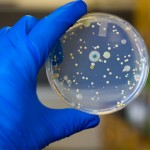 May 24, 2011. Drug-resistant bacteria—“superbugs”—are becoming a global crisis. But the government not only thwarts the development of new antibiotic drugs. It also willfully ignores powerful natural therapies and cures.
May 24, 2011. Drug-resistant bacteria—“superbugs”—are becoming a global crisis. But the government not only thwarts the development of new antibiotic drugs. It also willfully ignores powerful natural therapies and cures.
Last August, the UN’s World Health Organization issued a global alert on the dangers of drug-resistant bacteria: “Some bacteria have developed mechanisms which render them resistant to many of the antibiotics normally used for their treatment, so pose particular difficulties, as there may be few or no alternative options for therapy.” Germs resistant to one or more drugs kill 100,000 US hospital patients a year and cost the healthcare system more than $34 billion, according to the Infectious Disease Society of America. This could easily rise to the millions worldwide as major bacterial pandemics emerge.
And as we reported in February, the world is also facing wave after wave of antibiotic-resistant bacteria in our food—a consequence of farmers’ overuse of antibiotics for their animals, and doctors’ routine prescribing of antibiotics to treat sore throats and other non-bacterial illnesses.
At first glance, it would appear that the mainstream medical solution is to treat drug-resistant bacteria with more drugs. Optimer Pharmaceuticals, for example, is in the process of developing five new antibiotics over the next three years to treat drug-resistant germs. Other biotech companies are following suit. This will solve the problem—right?
Wrong. It is almost impossible to get a new antibiotic through the FDA these days. Partly because the new antibiotics can be genuinely dangerous. Partly because the FDA is dragging its feet out of fear of making a mistake. Forbes magazine recently reported that the prohibitive cost and bureaucracy of the FDA approval process is killing innovation and new treatments, noting that the agency’s “notoriety for making the approval of new drugs ever more expensive—with nothing to show in efficacy and safety—has been increasing over the years.”
After Ketek, a much-hyped antibiotic from Aventis, had to be restricted because the pill caused liver damage and Congressional hearings criticized FDA officials, standards were tightened at FDA; in 2008, only one new antibiotic made the cut. In effect, the agency seems to have decided to “let people die by depriving them of new medicines [rather] than to be excoriated” for approving medications with unintended side effects.”
According to Forbes, “The FDA recently attended a meeting on the antibiotics crisis. Since then, astonishingly, the agency has implied it only would ‘consider’ revamping its slow and deadly approval process. No wonder Pfizer has thrown in the antibiotics towel; more companies are sure to follow.”
Of course antibiotics are not the only way to control drug-resistant bacteria, just the only way that the government and the drug industry is interested in. There are highly effective natural solutions without the side effects—yet they are not being developed, or even fully researched.
Elderberry, Echinacea, and Goldenseal are a few exceptional examples which have plenty of scientific support. Goldenseal (Hydrastis canadensis) extract exhibits a broad spectrum of antibiotic activity. It has shown activity against bacteria, protozoa, and fungi, including Staphylococcus, E. coli, Salmonella and many others. The berberine in Goldenseal appears to inhibit the adhesion of bacteria to host cells and prevent their growth. Berberine has been shown to be 3 times more effective at lowering fevers than aspirin.
Echinacea (Purple Cone flower) contains a wide array of active immune stimulating components. Inulin activates part of the immune system known as the alternate complement pathway, which enhances the movement of white blood cells into the area to destroy bacteria, viruses and other microorganisms.
Elderberry (Sambucus nigra) has been found to be effective against multiple strains of Influenza A and B viruses. Elderberry is a neuraminidase inhibitor, like the prescription drug Oseltamivir (Tamiflu). It works by blocking the release and spread of the influenza virus within the body. In a double blind clinical trial on patients infected with the influenza virus, 90% of the group taking Elderberry extract recovered completely from the fever, chills, body aches, and cough twice as fast as the group receiving the placebo (within 3 days rather than 7).
These herbal medicines are not being developed for only one reason. They cannot be patented because God holds the patent for them. A patent can only be given for a substance that does not already exist on planet earth. Therefore, drug companies try to copy natural elements and then alter them just enough to claim it is unique. To me this is nothing less than plagiarism and copy right infringement.
In addition to herbal medicines there are nutrients that boost immunity as well. Vitamin D is a good example. In fact, it is so effective in maintaining a robust immune system that drug companies are now trying to make synthetic analogs of vitamin D to help fight a number of diseases, including cancer and chronic kidney failure. Of course, they will have to alter the natural substance just enough to make it unique, which will change it just enough to cause some serious side-effects.
Against the backdrop of so many natural successes, one will always find naysayers like Forbes’ contributor Steven Salzberg, who claims that “Pseudoscience is insinuating itself into our medical schools across the nation, going by the latest buzzword, ‘integrative medicine.’”
This is actually quite hypocritical. The truth is that there is plenty of science behind using the immune system to kill viruses and bacteria. The body has the best pharmacy in the world within in itself. It fights viruses, bacteria and even cancer every day.
Acknowledgement: http://www.anh-usa.org/superbugs-will-millions-die-needlessly-before-we-act/

